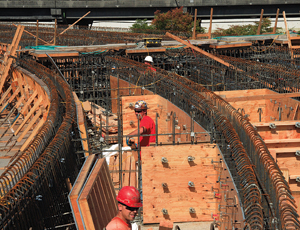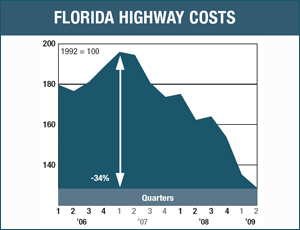The $787-billion American Recovery and Reinvestment Act has about $130 billion slated for construction. While much of the money is slow in coming, the first wave of funded projects typically were repaving and other quick, off-the-shelf highway projects. These had contractors scrambling and bidding ferociously, keeping prices at bare-bone levels and opening the door for even more construction projects.


“The lower bids we received on the 181 projects we had certified for stimulus- act funds have allowed us to certify another five state and 10 local projects so far, and there are more in line,” said Melanie Coon, spokeswoman for the Washington State Dept. of Transportation. “The stimulus funds, combined with the lower prices and money we had from a state gas tax, have made it possible for us to go ahead with $1.4 billion worth of critically needed work on highways and bridges statewide.”
States are seeing bids drastically lower than state estimates because contractors no longer have to factor in the risk of volatile materials prices since those costs now are stable, says Bob Burleson, president of the Florida Transportation Builders Association. He notes that the risk two years ago was much higher because, when a contractor asked a steel or cement supplier for an escalation factor, they were told the material would cost whatever it costs at the time of purchase, with no price guarantees or commitments. “That risk was not cheap. Today’s situation is different,” Burleson says.
Bids also are lower because “contractors are doing whatever they can to survive, taking jobs at cost, sometimes below, [with] twice as many bidders on a given project,” says Burleson. “The stimulus helped stop the free fall in materials prices, but the feeding frenzy of low bidding by contractors is still going on.”
“It is almost an anomaly to award a project that does not have cost savings,” says Timothy Tait, a spokesman for the Arizona Dept. of Transportation. “We had one day where bid savings on different projects ranged from $7,000 to $3 million dollars. The stimulus funds and the savings have helped us fund more projects than we anticipated, but there are a lot more that are just as critically needed,” he says.
A report by the White House Council of Economic Advisors released on Sept. 10 said the economic stimulus so far saved or produced about 1 million jobs overall, including 133,000 in construction.

Post a comment to this article
Report Abusive Comment